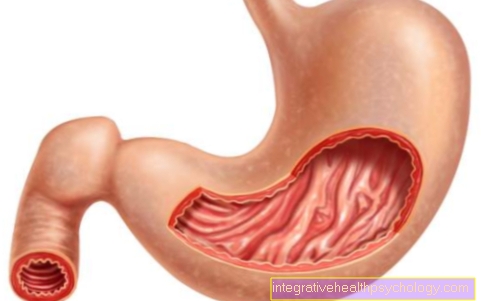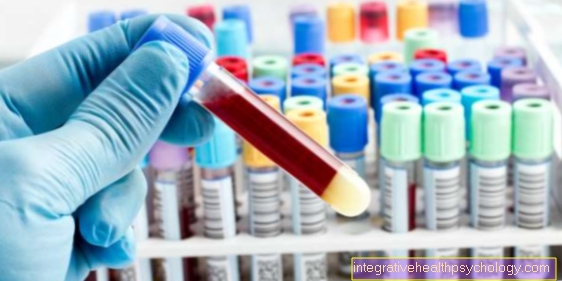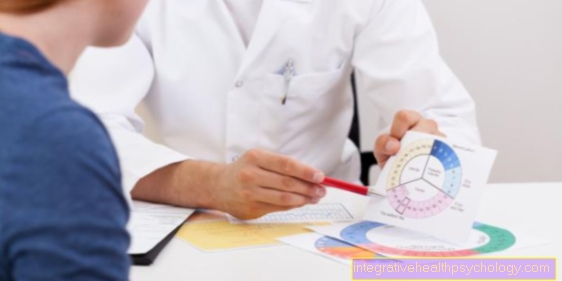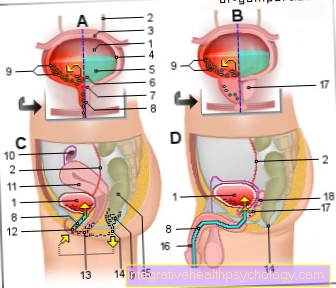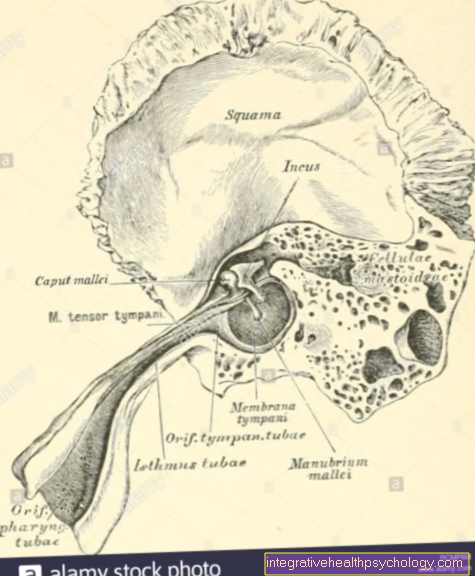Abdominal influenza
introduction
Gastrointestinal flu is not a flu illness caused by flu viruses in the intestines, as the impression might give. In the case of gastrointestinal flu caused by viruses or bacteria, the pathogens nest in the intestinal mucosa and multiply there, then disrupt the entire digestive process and also activate the immune system, which leads to inflammation of the intestinal mucosa.

If bacteria are not found directly on site, their poisons (toxins) or components of their shell can have the same effect on the mucous membrane of the gastrointestinal tract.
The other causes, too, all have in common the inflammation as the trigger for the symptoms of gastrointestinal flu.
In medical terminology, gastrointestinal flu is also called gastroenteritis designated. Since in medicine inflammations are generally identified with the ending "-itis", the name already shows that gastroenteritis stomach (=Guest) and Intestines (=Enterum) ignite.
The inflammation can cause the Mucous membrane cellslining the intestines inside it, theirs Function not more right fulfill and the food components and fluids ingested remain in the intestine instead of being absorbed into the body as usual.
This leftover food bind additional water in the Intestines and the chair will increasingly thinner - the typical one diarrhea (Diarrhea) arises.
Duration of gastrointestinal flu
The duration of gastrointestinal flu depends on which pathogen triggered the disease. The symptoms usually begin with nausea and vomiting. In the course of the illness, diarrhea and abdominal pain also set in. These then often last the longest. If viruses, such as the rota or norovirus, are the cause of the disease, the symptoms usually appear very suddenly with a rapid worsening. But they only last for an average of 1 - 5 days. Bacteria that can cause gastrointestinal flu are, for example, Campylobacter, Salmonella or E. coli bacteria. If they are the trigger of the disease, the symptoms usually last between 1 and 2 weeks. However, salmonella in particular can remain in the body after the symptoms have subsided and the disease can also be present in the stool for up to a few months.
It can also happen that an acute gastrointestinal flu does not completely heal and persistent symptoms such as nausea or diarrhea occur. If this is the case, a doctor should be consulted. This can clarify the cause of the permanent complaints by examining the patient. On the one hand, it can be an inflammation of the gastric mucosa caused by the irritation of the stomach after a gastrointestinal flu. On the other hand, it should also be excluded whether there are parasites that can also cause long-term complaints.
Read more on the subject at: Duration of gastrointestinal flu
How long will I be on sick leave?
The length of time you are on sick leave depends on the severity of the gastrointestinal flu and whether the doctor assumes that the disease is caused by viruses or bacteria. If the symptoms start very suddenly, without an obvious cause such as suspected food poisoning, a viral infection can be assumed. The patients are usually on sick leave for the next 3 days. If the beginning creeps up or after eating spoiled food, the patient can be written off sick for a week to 10 days.
What is the typical course of gastrointestinal flu?
The course of gastrointestinal flu depends on which pathogen caused the disease. If viruses are responsible for the infection, symptoms start very suddenly. The first symptoms are nausea, which worsens rapidly and is often followed by vomiting. In the further course, diarrhea and cramp-like abdominal pain can follow. However, the symptoms usually go away as quickly as they came. This is why a viral gastrointestinal flu usually ends after 1-5 days.
The course of gastrointestinal flu, which is caused not by viruses but by bacteria, is, in contrast, a little longer. Here, too, the symptoms begin in the upper gastrointestinal tract. Symptoms slowly creep in and gradually worsen. The diarrhea is often more pronounced in bacterial infections. This is because some bacteria produce toxins that lead to increased salt excretion. The salt in the gastrointestinal tract binds water to itself, making the stool more fluid. Fever is also more common as a result of bacterial gastrointestinal flu. Whether antibiotic therapy is necessary to cure the disease should be discussed with your family doctor. The bacterial infection of the gastrointestinal tract lasts for 1-2 weeks, with the symptoms gradually improving over time.
How long is the incubation period for gastrointestinal flu?
The incubation period describes the time between infection with the pathogen and the first appearance of the symptoms. Like the duration of gastrointestinal flu, it depends on the type of pathogen. If viruses are the cause of the disease, the symptoms appear a short time after infection. The incubation time for rotavirus is 1-3 days, for norovirus it is only 6 - 50 hours. Among the bacteria, salmonella are the ones that lead to the fastest onset of symptoms. They are often ingested through spoiled food. The first symptoms appear a few hours to a few days later, depending on the amount of bacteria that has been ingested.
Most bacteria, however, have a longer incubation period. The incubation time of a Campylobacter infection is 2 - 6 days. The various E. coli bacteria cause the first symptoms between 2 and 10 days. A travel infection is often caused by the ETEC pathogen. It leads to the well-known traveler's diarrhea, which appears for the first time 1-4 days after infection.
How long is the infection duration?
The duration of infection depends on the pathogen that caused the gastrointestinal flu. Viruses usually have an infection duration that only lasts a few days beyond the symptoms. The norovirus, for example, is usually no longer contagious a week after symptoms have occurred. In the case of bacteria, the duration of infection can be longer. Salmonella can still be excreted in the stool for up to 10 weeks after the gastrointestinal flu. It is very important to know that taking antibiotics in particular leads to a longer period of infection.
Symptoms of gastrointestinal flu
Sudden stomach ache, stomach ache, and cramps - these are the most common harbingers of gastrointestinal flu. Vomiting, followed by diarrhea, occurs soon after it occurs.
This sequence results above all in the case of infectious causes, i.e. viruses or bacteria, through the sequence in which the pathogen passes through the intestine. The first loss of appetite and vomiting come from the stomach, while the diarrhea from the rest of the intestine only develops later when the germ is transported along there.
The above-mentioned symptoms can transform those affected from perfectly healthy people to sick people lying in bed and suffering from massive discomfort within a few hours. If the inflammation extends beyond the innermost layer of the mucous membrane to deeper layers of the intestinal wall, the diarrhea can also be accompanied by blood in the stool. The biggest problem that results from diarrhea is the loss of fluid and salt from the body. Excessive losses can lead to circulatory weakness with dizziness and fatigue.
Read more on the subject at: These symptoms tell them that they have gastrointestinal flu
Vomit
Vomiting is a very common symptom of gastrointestinal flu. Accompanied by nausea, vomiting usually occurs at the beginning of the disease. It can be viewed as the body's response to the irritation of the stomach by pathogens. This reaction serves to protect against the disease. The body tries to get the pathogens out of the body through the mouth before they can cause further damage. If you vomit very heavily, the body loses a lot of water and stomach acid. Since this can be very dangerous, you should first drink enough water and consult a doctor if the symptoms persist.
nausea
Nausea is usually the first sign of gastrointestinal flu and is often accompanied by vomiting. The nausea is caused by the fact that the pathogens that are absorbed through the mouth arrive in the stomach and attack the gastric mucosa there. The damage can continue even after the illness and it can take a few days for the gastric lining to completely regenerate. For this reason, the nausea often lasts a little at the end of the illness and is particularly noticeable when the stomach is stressed, such as after eating.
Read more on the subject at: Abdominal pain and nausea
stomach pain
Abdominal pain is also a symptom that occurs in many cases of gastrointestinal flu. On the one hand, they arise from the damage that the pathogens cause in the gastrointestinal tract. On the other hand, the body's defense mechanisms against the disease, such as vomiting the contents of the stomach, can further irritate the mucous membrane and lead to abdominal pain. In addition, the abdominal pain can become more pronounced when defecating.
Flatulence
Flatulence generally arises from the fact that bacteria, which occur naturally in the intestine, use food components for their own metabolism. This creates gases that spread like air in the intestine and inflate the stomach. With gastrointestinal flu, there are usually additional bacteria in the intestine that do not belong there and therefore trigger the symptoms. They too can produce gases that can lead to increased flatulence.
Read more on the subject at: Flatulence
fever
To fight off gastrointestinal flu, the body activates the immune system. This sets various mechanisms in motion that are supposed to lead to the death of the pathogens. These mechanisms also include an increase in body temperature, i.e. fever. In order to achieve a rise in temperature, for example, the body increases the tension in the muscles or tightens the vessels in the arms and legs so that less heat is lost here.
Body aches
Pain in the limbs is also a sign of the immune system's reaction to the pathogen. In order to set the various defense mechanisms in motion, messenger substances are released throughout the body. These activate, for example, other cells of the immune system that are supposed to kill the pathogens. However, since these messenger substances also activate signaling pathways that are responsible for the conduction of pain, pain in the limbs occurs, among other things. In addition, the body's defense reactions require a lot of energy, which is why one generally feels weak and weak.
Can you have gastrointestinal flu without vomiting?
Gastrointestinal flu can occur without vomiting. Some bacteria in particular, such as some E. Coli bacteria, are increasingly causing problems in the intestinal area. This is why diarrhea is more common than vomiting with these infections. In addition, the nausea is different in every person, which is why a mild gastrointestinal flu occurs in some people with vomiting, in others without.
When do I have to see a doctor?
A doctor should be seen if symptoms persist and are severe. Large fluid losses due to vomiting or diarrhea must be compensated for, especially in children and the elderly. If this is no longer possible through food, the doctor can give an infusion. Even if you have a high fever, you must see a doctor. You should also introduce yourself to the doctor if you have just been abroad. This is particularly important after traveling outside of Europe, as the doctor should rule out notifiable diseases or an infection with parasites.
Causes of gastrointestinal flu
The causes of gastrointestinal flu can be very different and in most cases can be traced back to viruses, bacteria, fungi, toxins or other single-celled organisms (e.g. protozoa).
Viruses
Among the viruses that can cause gastrointestinal flu, the noroviruses are by far the most feared genus and the course of a norovirus infection is often more severe than gastrointestinal flu caused by other germs.
In contrast to all other gastrointestinal flu pathogens, the norovirus can also be transmitted through the air and is therefore particularly contagious.
When those affected vomit, the smallest virus particles are released into the air, which can then be inhaled by others and thus gain access to the gastrointestinal tract of the next person.
A gastrointestinal flu caused by noroviruses must be reported to the health department.
It is also important to keep in mind that after the symptoms have subsided, those affected can still excrete or carry contagious particles without being ill themselves.
These particles are still active and can still infect other people, even if the former affected person already feels healthy again.
Viruses as the cause of gastrointestinal flu are particularly prevalent in winter, while bacteria are more likely to be the cause in summer. Rotavirus is the most common cause of gastrointestinal flu in infants and young children.
Almost every child will meet him at least once in their lifetime.
A vaccination against this pathogen has recently been possible. This vaccination is carried out in infancy from the 6th week of life, has to be done twice and is carried out by the STIKO (Standing Committee on Vaccination) recommended for all babies in Germany.
bacteria
Bacteria are responsible for gastrointestinal flu, especially in the warm season.
Like viruses, bacteria often enter the body of the person concerned via so-called "smear infection".
Smear infection here means the transmission through direct skin contact with infected people if they still carry the germ on them through insufficiently cleaned hands.
The germ is then passed on to other people through physical contact.
On their hands, the germ can enter the gastrointestinal tract through mouth contact.
The best-known and most frequent bacterial causes of gastrointestinal flu are clostridia, yersinia or salmonella, which has become known through many food scandals. Salmonella are a large group of bacteria, almost always of which are the subspecies Salmonella enterica is responsible for food poisoning.
Salmonella is not infrequently transmitted to humans through animal products, especially poultry or eggs.
They impress with a particularly long survival time outside the human body: In order to kill them reliably, a cooking time of at least 10 minutes above 75 ° C is necessary.
Freezing cannot harm the bacteria, and they are still viable in dried feces after 2.5 years.
Only common disinfectants kill them reliably within a few minutes and should therefore be used liberally in the event of illness. An infection with Salmonella is to be reported to the health department like an infection with noroviruses. Poisons
Poisons
Poison as the cause of gastrointestinal flu is usually not intentionally absorbed into the body.
Rather, most poisons are absorbed as bacterial components through food and then appear as food poisoning.
Clostridia and staphylococci are known for this type of gastrointestinal flu. Among the non-bacterial poisons, mercury and lead, which can be found in many household items, should be noted.
Unicellular organisms
Single-cell organisms such as amoeba often play a role as amoebic dysentery in people returning from tropical countries.
Only a few of the pathogens occur in Europe, which does not completely rule out amoebic dysentery in Europe.
The gastrointestinal flu caused by the pathogen Giardia lamblia is particularly dangerous, as it can migrate through the intestinal wall to other organs, which can often result in life-threatening complications.
Rays
Radiation therapy is often used in combination with chemotherapy and surgery to treat many tumor conditions.
In the case of radiation, as in all other types of cancer control, not only tumor cells but all rapidly dividing cells are affected by the therapy. This is noticeable in hair loss, brittle fingernails or inflammation of the mucous membranes.
In the gastrointestinal tract, this inflammation leads to the symptoms of gastrointestinal flu due to the enormous mucosal surface of several hundred square meters.

Therapy for gastrointestinal flu
Gastrointestinal flu usually ends on its own within a few days to a maximum of 2 weeks. In most cases, drug therapy is not necessary. Since most cases are caused by viruses, an antibiotic is rarely necessary and should only be used if the bacterial cause is proven.
Antibiotics have no effect on viruses. The most important representatives of the antibiotics used are metronidazole, ciprofloxacin or trimetoprim in combination with sulfmethoxazole.
All of these preparations are ideal for a wide variety of germs in the intestine, so that an exact determination of the bacterium is not always necessary.
In all cases it is important to compensate for the loss of fluids caused by diarrhea and the loss of important salts in the body.
This loss can lead to dehydration of the body and in extreme cases it can be life threatening.
Babies and the elderly in particular are at risk of dehydration fairly quickly. A hospital stay is then necessary in order to compensate for the loss of fluid and salt by injecting fluids directly into the body's vascular system, the so-called "drip".
Outside the hospital, it is important to keep the loss of fluids as low as possible by drinking enough water.
Tea is particularly suitable for this, especially herbal teas such as black tea or chamomile tea, as these are also said to have a calming effect on the gastrointestinal tract.
Peppermint and ginger tea can also calm the "grumbling", highly active stomach and relieve nausea.
Cola is also very suitable, as its high sugar content also promotes fluid absorption in the body.
From the field of naturopathy, healing earth has also proven itself as an additive in drinks.
For the simultaneous replacement of lost salts (Electrolytes) there are also special solutions available in pharmacies, the so-called rehydration solutions, which precisely compensate for the loss of salts.
However, these mixtures can also be easily made yourself from recipes that can be found on the Internet.
If the diarrhea persists or if it has to be stopped on certain occasions, the drug Loperamid® or butylscopolamine (Buscopan®) can be used in exceptional cases, which can stop the diarrhea by stopping the bowel movements.
Perenterol® is available as a natural alternative and contains a yeast that inhibits the growth of harmful intestinal bacteria.
In cases of severe nausea, it is not uncommon for an anti-nausea agent such as metoclopramide (= Paspertin ) extremely helpful to make the disease more bearable.
As food intake seems impossible in most cases, fasting is usually not a big problem for those affected in the first few days of the disease. If food can be consumed, it is important to eat as sparingly as possible.
Light foods such as rusks, clear soups, bananas, grated apples, gruel soup, pretzel sticks or white bread are ideal to start with.
Salt sticks and clear soups can also be used to compensate for the loss of salt, especially the loss of sodium.
Food intake should be restarted as early as possible in order to stimulate bowel movements.
Many doctors also recommend taking something called probiotics. These consist of bacteria that occur naturally in the intestine and are intended to help restore balance to the intestinal flora that has been damaged by the pathogens.
Read more on this topic under: Medicines for gastrointestinal diseases
What drugs help with gastrointestinal flu?
The treatment of gastrointestinal flu also depends on the cause of the disease. There are no drugs against viruses that are used in gastrointestinal flu, so only the symptoms can be treated here. Bacteria can be killed with the help of antibiotics if the bacteria are detected. These drugs should only be used in the case of gastrointestinal flu in exceptional cases in the case of life-threatening illnesses. The reason for this is, on the one hand, that taking antibiotics promotes the development of resistance, which means that the drugs lose part of their effectiveness with each dose. On the other hand, the patients excrete the antibiotics for a longer period of time, thus increasing the risk of infection.
In the case of gastrointestinal flu, it is also very important to note that most of the symptoms are defensive reactions in the body against the disease. Vomiting and especially diarrhea are intended to transport the pathogens out of the body and thereby heal those affected more quickly. Therefore, medication for diarrhea should only be taken in the case of severe gastrointestinal flu, such as suspected loss of fluid and salt. Opioids such as loperamide are suitable for this.
If the loss of fluid and salt can no longer be compensated by food, they can be compensated for with infusions. Antiemetkia such as Vomex® are effective against vomiting. Furthermore, to support the regeneration of the intestinal mucosa, probiotics, i.e. bacteria that naturally live in the intestine, can be taken in the form of tablets or powders.
Read more on the subject at: Medicines for gastrointestinal diseases
Which home remedies can help?
There are some home remedies that can help relieve gastrointestinal flu symptoms. The first to be mentioned are herbal teas such as chamomile tea. They calm the gastrointestinal tract and alleviate the ongoing inflammatory processes. There are also special gastrointestinal teas with selected herbs in the pharmacy. Fresh, grated apples are also said to be effective against bacteria. However, only a few apples should be eaten, as the acid they contain can damage the gastric and intestinal mucosa.
In contrast, probiotic yoghurts are helpful in regenerating the damaged mucous membrane. They contain bacteria naturally occurring in healthy intestines, which are important for proper colonization of the intestine. In addition, cooked aubergines should contribute to the healing process. In addition, ginger and licorice root can help against nausea. The well-known tip cola and pretzel sticks is effective because salts and sugar are absorbed together. So you can also take up better salt by eating pretzel sticks and grape sugar at the same time. Due to the many unhealthy ingredients, however, the consumption of cola should be avoided.
Homeopathy for gastrointestinal flu
Homeopathy is based on taking substances in a very dilute concentration. The effect of homeopathic remedies is therefore controversial. Nevertheless, these funds help many people. In the case of gastrointestinal flu, substances such as Ipeauanha, the emetic root or Podophyllum, the foot leaf, can be used. However, if you have severe gastrointestinal flu, you should see a doctor.
What should I eat if I have gastrointestinal flu?
In the case of gastrointestinal flu, the lining of the gastrointestinal tract is damaged and needs some time to regenerate. Therefore, large, heavy meals and high meat consumption should be avoided. On the other hand, you shouldn't stop eating completely, otherwise the mucous membrane needs even more time to get used to normal food and the diarrhea lasts longer. For this reason, one should start eating light and gentle food. For example, rusks or soft bread are suitable.
In addition, the body loses a lot of salts and fluids with gastrointestinal flu. These have to be balanced with food. Salty, light dishes such as bouillons or noodle soups are best suited for this. Other important substances, such as potassium, are also lost in the body during diarrhea. This can be balanced out by using bananas, which also have a constipating effect. In addition, care must be taken to drink plenty of fluids. Coffee should be avoided here as it can further irritate the mucous membranes. Water or herbal teas, however, are better.
What are the risks of gastrointestinal flu during pregnancy?
If you have severe gastrointestinal flu during pregnancy, your child is at risk. First of all, it should be made clear whether it is really a gastrointestinal flu or normal digestive problems that occur during pregnancy. Vomiting is a common symptom of pregnancy, especially in the first few months. Changes in bowel movements also often occur during pregnancy. However, if diarrhea or vomiting persists or is severe, a doctor should be consulted. There is a risk that too much fluid and too many salts will be lost. If they are not balanced with food, both mother and child can become dehydrated. In addition, the loss of minerals can lead to cardiac arrhythmias, for example, which are dangerous for mother and child. In addition, minerals are important for the development and growth of the child. A long-term deficiency can, for example, cause nerve, bone or muscle damage. To compensate for the losses, the mother can be given an infusion or, if the diarrhea is very severe, the doctor can prescribe medication.
What is the route of infection with gastrointestinal flu?
The most common way of infection with gastrointestinal flu occurs via bacteria from the stool, which are absorbed back into the mouth through a so-called smear infection. This means that, for example, a person who did not clean their hands enough after a bowel movement touches another person's food and transfers the bacteria to it. Impurities in the hands are invisible to the naked eye and are quickly overlooked. For this reason, particular care should be taken to ensure hygiene in the event of illness in the family or in a household. For example, a hand disinfectant can be used in addition to hand washing. Particular attention must be paid to cleanliness when changing diapers for sick children.
Other types of bacteria, such as salmonella, are found in contaminated food or food that has been stored for too long. They are absorbed when the food is consumed and, even in small amounts, can cause discomfort. Also, because some viruses are much smaller than bacteria, they can spread through airborne droplets.This can occur with very strong vomiting and infect people who come into contact with it.
diagnosis
Diagnosing a Abdominal influenza is usually put quite simply because of the symptoms.
Which one Pathogen the underlying inflammation is usually irrelevant, as in the vast majority of cases they all heal within a few days.
Only when the diarrhea and the complaints persist, one becomes the special one Pathogen from a stool sample filter out and determine in order to then be able to initiate a special therapy.
Experienced doctors and nurses can part of the pathogen already based on of the Color, consistency and smell of the stool identify and therefore request a stool sample for viewing.
The stool can also be examined for bacteria in the laboratory.
The extent of fluid loss can be determined from the assessment of the Mucous membranes in the eyes or that mouth determine very well.
The extent of the salt loss can be determined using a standardBlood test be estimated.
How do I know it's the norovirus?
The symptoms of the norovirus appear very quickly after infection. You can recognize it by the sudden surge of vomiting that is accompanied by very liquid diarrhea. These symptoms are accompanied by nausea and pain during bowel movements. There are also general exhaustion, muscle pain and headaches, but often no high fever occurs. The symptoms last for 1-2 days and then go away as quickly as they came.
Read more on the subject at: Norovirus
How do I know if it's rotavirus?
Infants and children are often infected with rotavirus. Here, too, the symptoms appear very suddenly. Watery diarrhea, which can also contain mucus, is in the foreground. In addition, vomiting, fever and bulging pain occur. It should be noted that a lot of water is lost through diarrhea and vomiting, which should be replaced by drinking more, especially in children. The rotavirus can also be recognized by the fact that it is also associated with breathing problems. In most cases, the symptoms subside after 2-6 days.
How do I distinguish gastrointestinal flu from food poisoning?
The difference between gastrointestinal flu and food poisoning is what is causing the symptoms. In the case of gastrointestinal flu, for example, bacteria are ingested through food that infect the gastrointestinal tract and make it sick. They multiply and produce, among other things, toxins that promote diarrhea and attack the mucous membrane. In contrast, food poisoning does not ingest the bacteria themselves. Food poisoning occurs when food contaminated with poisons is ingested. These poisons can be produced by bacteria, for example. There are harmful substances in the gastrointestinal tract that can cause discomfort, but they are not produced again. If they are eliminated from the body, the symptoms usually improve very quickly.
forecast
Even if complaints like diarrhea and Vomit Not one of the most pleasant sensations in our body, these symptoms are, with sufficient attention to the Fluid and salt balance mostly temporary and end without Medication within a few days.
With pronounced Circulatory weakness hospitalization may be necessary.
The mortality rate is disappearing in the western industrial nations due to the excellent and always available medical care low.
In developing countries without this comprehensive medical care, one ends Abdominal influenza by the extreme Loss of salt and fluidswhich cannot be compensated for without medical help, is often fatal.
prophylaxis
The easy transmission routes make prevention very difficult.
Among other things, it applies above all to your own Personal hygiene to pay attention. Regular Wash your hands can enormously reduce the number of germs on the hands, since most pathogens are outside the Gastrointestinal tract can only survive for a very short time.
This is especially important Washing hands after using the toilet as well as before preparing food in the kitchen.
To get the transfer through contaminated foodas it is for example with Salmonella This is often the case, should also be avoided during cooking and after the meat preparation hands Thoroughly washed and cutting boards carefully cleaned before further food is prepared.
To that Transmission risk To keep as low as possible, sensitive patients should places such as Kindergartens, schools, hospitals and other public facilities avoid where many people meet and who Transmission probability is very high.
Sick people should stay at home so as not to unnecessarily infect other people.
Against a selection of pathogens there is also one Vaccination possible.
In Germany this is especially true vaccination against Rotaviruses as significant, since almost every child has it in their first years of life Rotaviruses will come in contact and a Abdominal influenza will go through.
In developing countries, in which adequate medical care cannot be guaranteed in the event of illness, vaccinations against cholera and typhus highly recommended. This Vaccinations should also be done urgently before traveling to these countries.
How can you prevent gastrointestinal flu?
Gastrointestinal flu can be prevented primarily through good hygiene conditions. This includes thorough and regular hand washing with soap. This is especially important after going to the toilet, before cooking or eating, and after spending time in public facilities and public transport. In addition, disinfecting the hands with skin disinfectants can offer further protection against infection. When traveling, you should make sure that foods such as fruits and vegetables are not eaten raw and unpeeled. Meat and fish must always be cooked through to keep the risk of infection low. In addition, tap water is not allowed to be drunk in many countries, as it is often contaminated and can contain gastrointestinal flu.
It is also very important to pay attention to hygiene when a member of the family or household is sick. In the event of vomiting or diarrhea, it must be cleaned as thoroughly as possible using gloves and disposable materials such as paper towels. In addition, you should pay attention to increased cleanliness in the bathroom, toilet and door handles and avoid eating and drinking from the same dishes. You can protect yourself against a few triggers of gastrointestinal flu with a vaccination. This applies, for example, to the rotavirus, against which babies in particular should be vaccinated.
Read more on the subject at: Vaccination against the rotavirus


